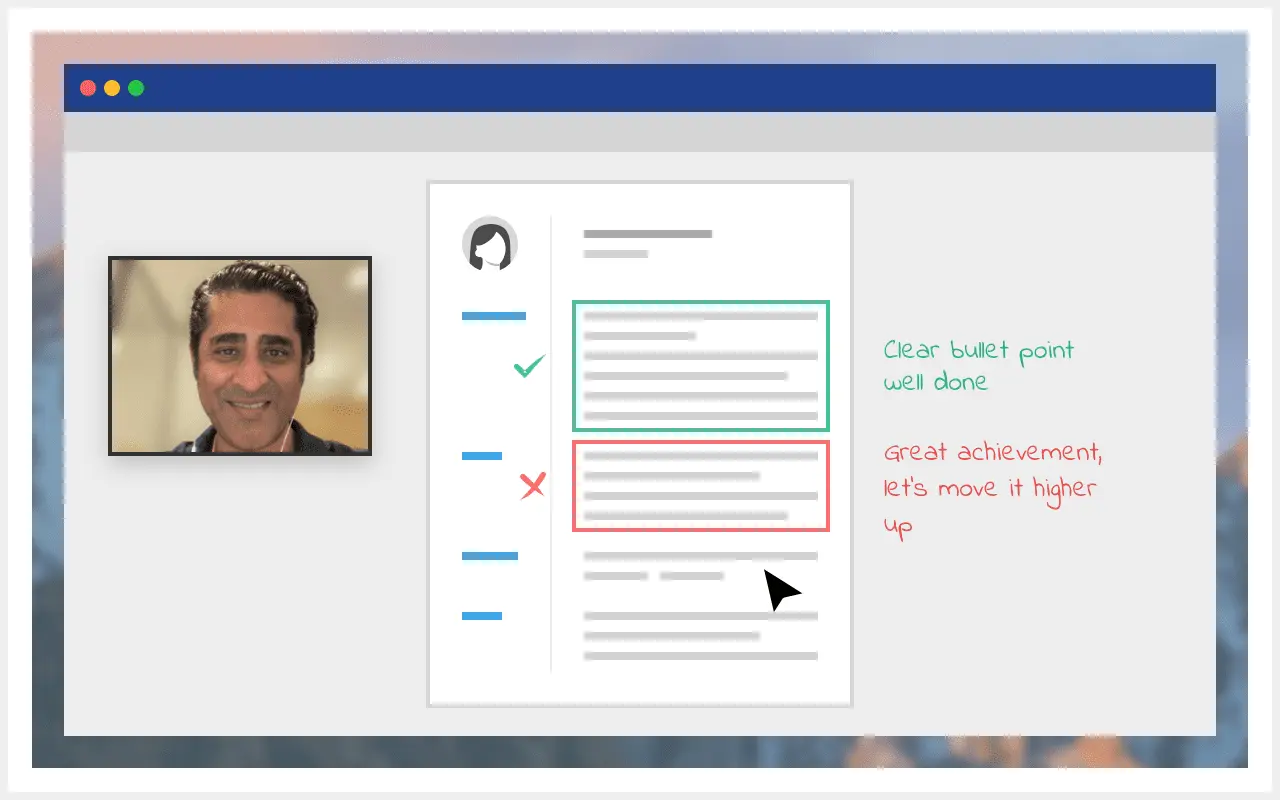The Big 3 are the three most prestigious strategy consulting firms in the world. They're also known as MBB, short for McKinsey, BCG, and Bain. If you have an interest in making a career in business, you may have thought of applying for a consulting position at one of them.
But here is the thing - it's hard to know what really makes MBB different from other consulting firms. So let's go over each firm, analyse what sets them apart and discuss which one you should join if you end up getting multiple offers.
Click here for a resume review with an ex-MBB consultant
Who are the Big 3 / MBB consulting firms?
Let's take a look at each firm's history, specificities and top alumni to give you a better grasp of what they are like.
McKinsey & Company
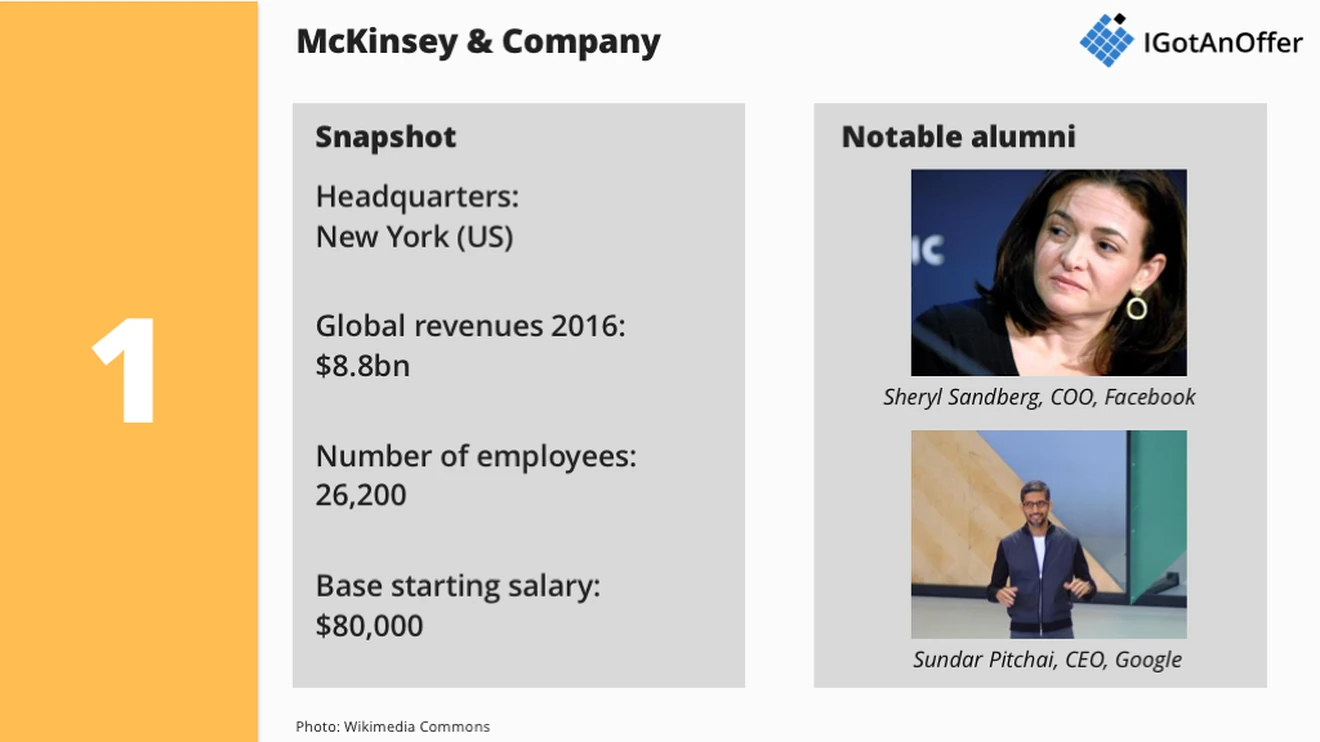
The firm was founded in Chicago in 1926 by James McKinsey, a professor of accounting at the University of Chicago. It started out by offering consulting services on accounting principles as a management tool.
McKinsey grew quickly in the 1940s and 1950s, especially in Europe. But in the 1960s, competitors like the Boston Consulting Group and Bain & Company started competing with McKinsey by marketing specific branded products, such as the Growth-Share Matrix, and by selling their industry expertise. In the 1970s the firm therefore shifted its focus from geographic expansion to industry specialisation.
Today, McKinsey employs 26,000 staff across 120+ offices and generates $8.8bn in revenues. Many of the company's alumnus have gone on to be CEOs of major corporations and the firm is sometimes dubbed the "CEO factory".
Top alumnus:
- Sheryl Sandberg, COO, Facebook
- James Gorman, CEO, Morgan Stanley
- Sundar Pichai, CEO, Google
- Oliver Bate, CEO, Allianz
- Lael Brainard, member of the US Federal Reserve's Board of Governor
Example interview questions:
- How many postmen are in New York City?
- Tell me about a time when you were not a formal leader but became a leader.
- Give me the book title and chapter titles for a major accomplishment of yours.
- What would you do if you didn't come to work at McKinsey?
- What do you think is the biggest probem in the economy at the moment?
Useful links:
- Official McKinsey website
- McKinsey Glassdoor page
- McKinsey interview process guide
- McKinsey case interview preparation free guide (by IGotAnOffer)
Boston Consulting Group (BGC)
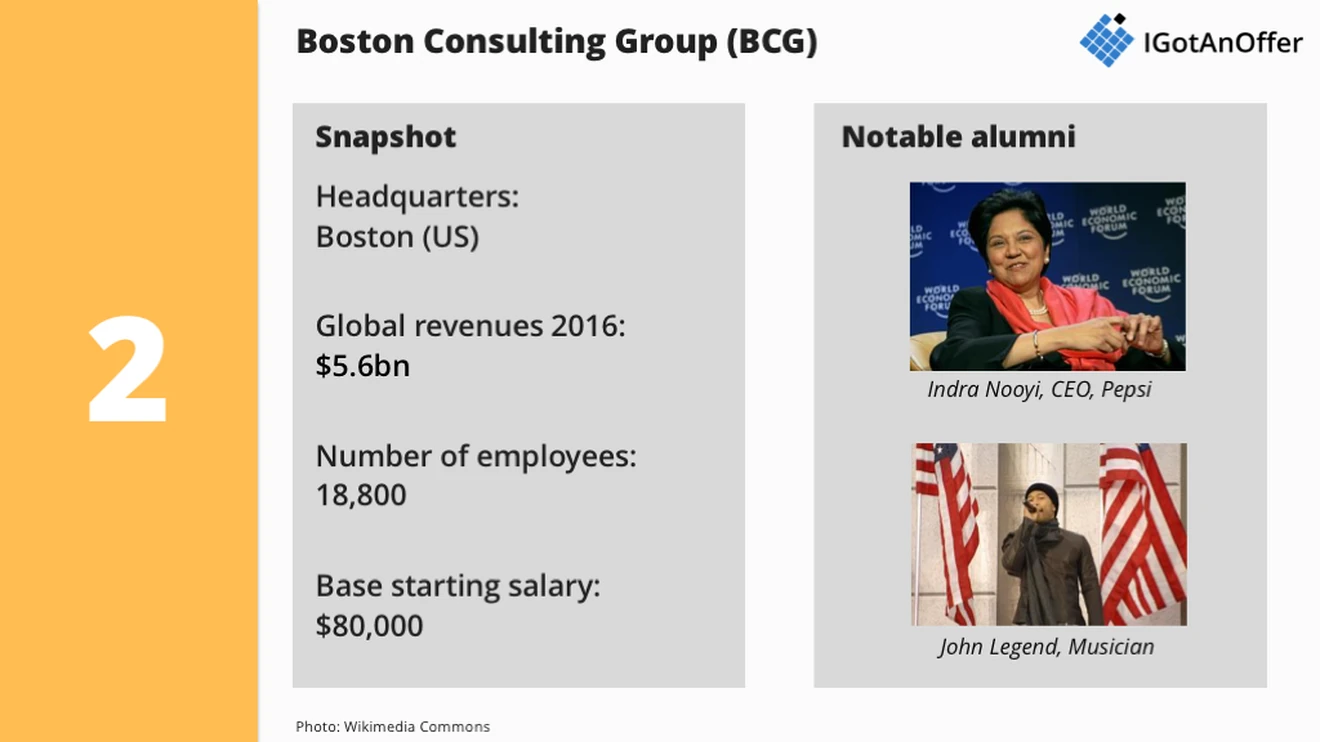
Bruce Henderson founded the company in 1963. Initially, BCG was a subsidiary of the Boston Company (an asset manager), before becoming independent in 1975. When BCG started, Henderson decided to focus on external factors such as markets and competition rather than looking at internal issues, which had been the traditional approach pioneered by McKinsey.
Henderson's new approach led to the discovery of important business concepts still used today such as the "cash cow," the "experience curve," and “time-based consumption”. He summarised these concepts in essays called Perspectives. They remained a BCG tradition and are still influential to this day.
Throughout the 1960s, BCG grew and developed overseas. It suffered a slight setback in 1973 when BCG vice-president Bill Bain left the company to found his own consulting firm, Bain & Co. During the 80s it continued to expand, with a radical boost in growth in the mid-90s.
The early 2000s put BCG under threat because of the economic crisis and rise in technology. But with $5.6bn in revenues and offices all over the world, the firm remains one of the most prestigious strategy houses in the world.
Top alumnus:
- Indra Nooyi, Chairwoman and CEO of PepsiCo
- John Legend, Musician
- Jeff Immelt, former CEO, General Electric
- Roland Berger, founder, Roland Berger Strategy Consultants
- Benjamin Netanyahu, Prime Minister, Israel
Example interview questions:
- How many pianos are in Poland?
- Who is the leader you admire most? Why?
- How do you choose members of your team? What attributes do you look for?
- Tell me about two characteristics of your personality you have to improve on.
- How do you manage your work-life balance?
Useful links:
- Official BCG website
- BCG Glassdoor page
- BCG Case interview free guide (by IGotAnOffer)
- BCG interview process guide (by IGotAnOffer)
Bain & Company
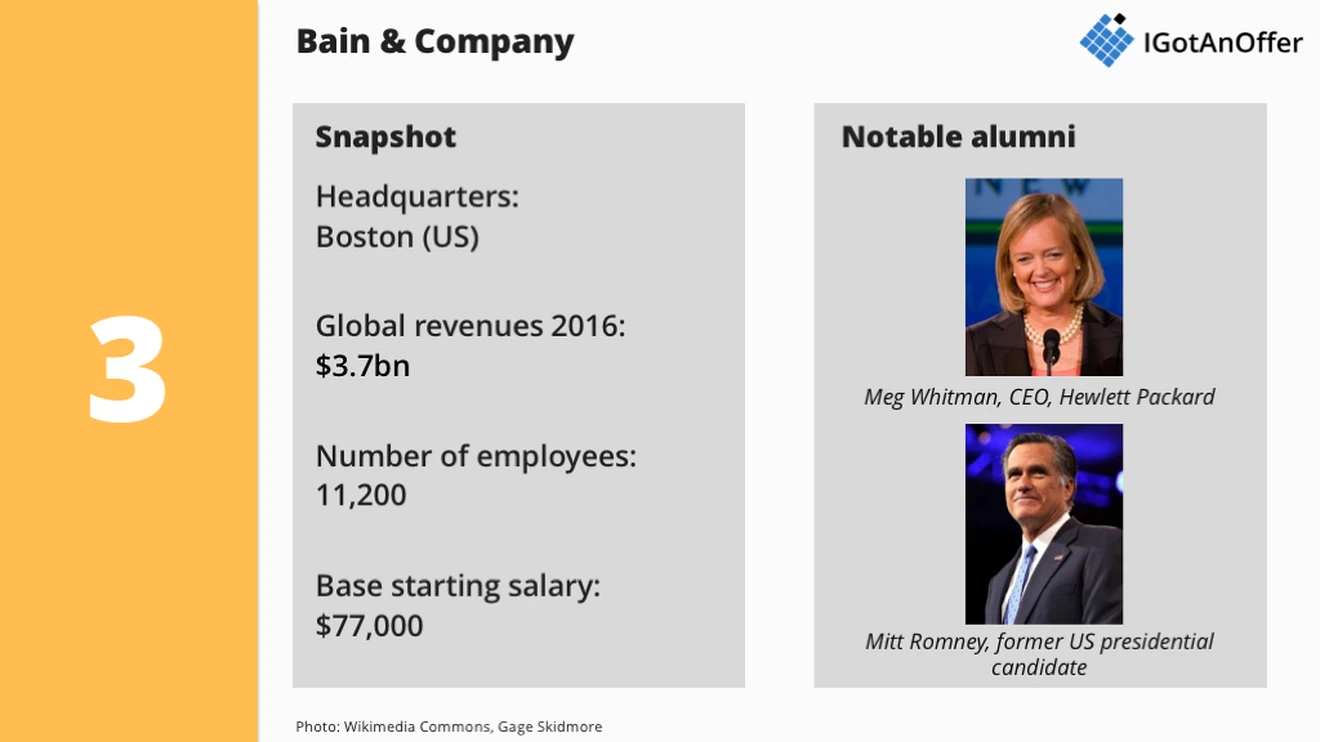
Bain & Company was formed in 1973 when Bruce Henderson's protégé Bill Bain left BCG to form his own consulting firm.
Bain & Company revolutionised the consulting industry by taking a different approach to client relationship management. When it started, it decided to only take one client per industry and to focus on developing long-term relationships with these clients.
This enabled Bain to win multiple projects from the clients it focused on and to maximise value per client. Before then, consulting work was mostly done on a project by project basis. And trying to win multiple projects from single clients was not a common strategy.
The company's CEO Manny Maceda has a 98% approval rating on Glassdoor, reflecting how well employees are taken care of. In fact, Bain has won several "Best Employer" awards and has a strong reputation for taking care of its people's work-life balance.
Top alumnus:
- Meg Whitman, CEO, HP
- Mitt Romney, former US presidential candidate
- Susan Wojicki, CEO, Youtube
- Mark Pincus, founder, Zynga
- John Donahoe, former CEO, eBay
Example interview questions:
- How much does a 747 plane taking off from LaGuardia en route to London Heathrow weigh?
- What is the exact angle formed by the hands on a clock when the time reads 9:30?
- How would you evaluate the value of a cow?
- Let's say I'm your manager and you get hired at Bain. At the end of one year, what will I write in your performance review?
- What do you think is the biggest challenge for a consultant? How would you personally cope with that?
Useful links:
- Official Bain & Company website
- Bain & Company Glassdoor page
- Bain Case interview free guide (by IGotAnOffer)
Why does MBB dominate other consulting firms?
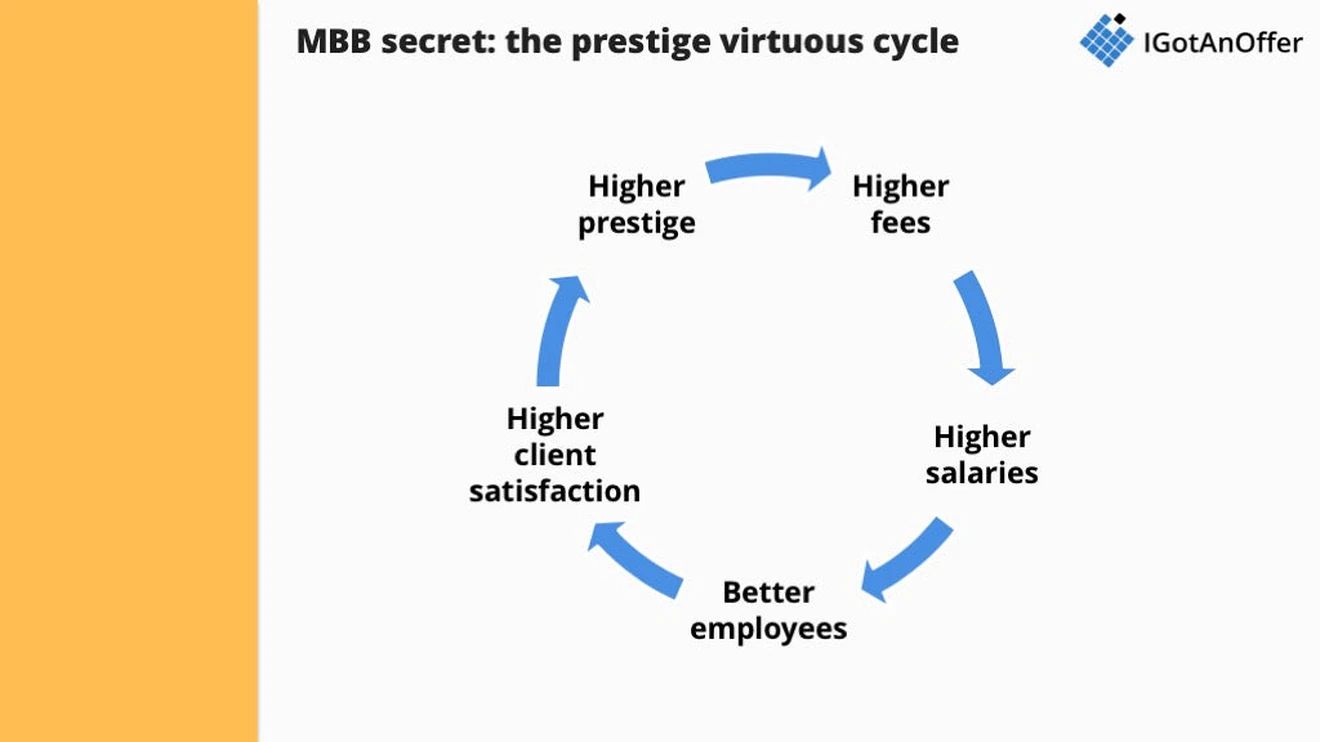
McKinsey, BCG and Bain were amongst the first consultancies to be created and have managed to create a virtuous cycle which has protected them from competitors so far. Here’s how it works.
Today, the three firms have a reputation as reliable and innovative problem-solvers. They enjoy higher prestige than other consulting firms lagging behind.
As a result of their higher prestige, they can command higher fees. When inviting consultants to pitch, a CEO would expect McKinsey, BCG and Bain to be slightly more expensive than the rest of the pack.
This in turn means that MBB can pay their employees higher salaries, better bonuses and greater perks (e.g. better flights, nicer hotels, etc.) MBB is therefore on the top of most consulting applicants’ list.
As a result, MBB usually has first pick in the candidate pool and can therefore select the best talent. Having the best talent means they have a higher chance of keeping clients happy, further consolidating the firm's reputation and prestige.
And the virtuous cycle goes on and on.
It’s important to note that this virtuous cycle is not completely indestructible. Certain companies like Monitor were enjoying a similar moat but the company still went bankrupt as a result of financial mismanagement and was later acquired by Deloitte.
Which one should you work for?
If you learn to consistently crack case interviews, it's not that uncommon to receive multiple job offers from MBB. Four of the top factors the candidates we work with usually ask us about are: salary, methodology, work-life balance and exit opportunities. Let's look at them one by one and analyse which firm is best for each.
Best for pay: McKinsey
While Bain and BCG pay generously across all career levels, they lag slightly behind McKinsey, who pays their entry-level consultants an $80k base salary which increases by about 20% every year.
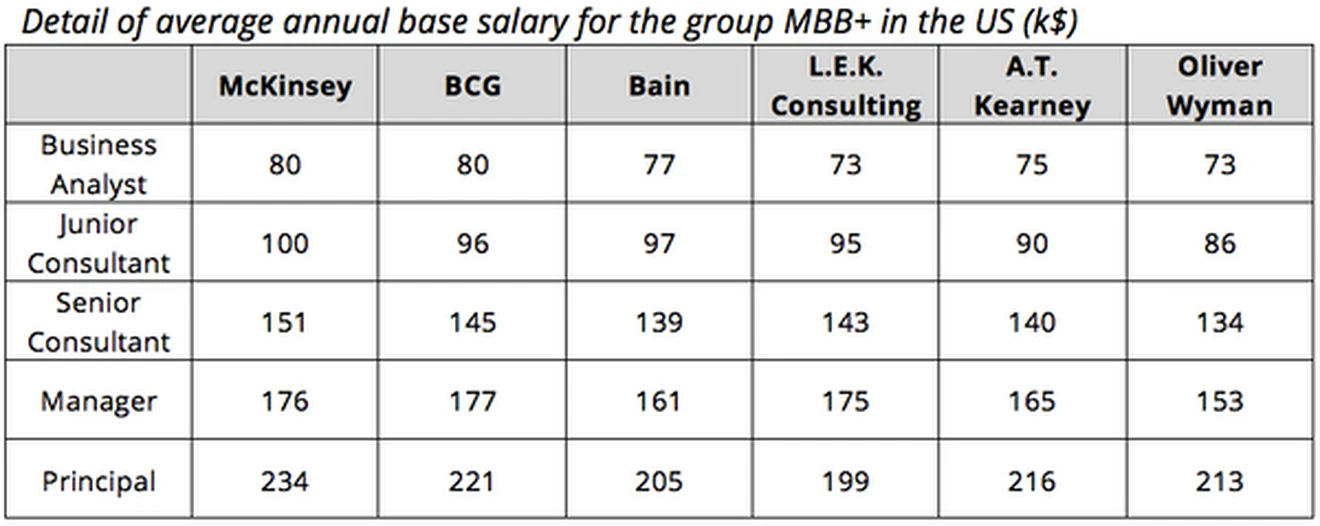
In addition to this base salary you'll also receive an annual bonus of about 20% depending on your personal performance. Finally, you can also expect a signing package and retirement contributions at all three firms.
Best for methodology: BCG
McKinsey, BCG and Bain each have a slightly distinct work approach. But the one that's best known for its frameworks and methodology is probably BCG.
Among other things, it is the inventor of the "growth-share matrix", a grid with four quadrants representing the four different kinds of products every business has. Cash cows own a large market share but have low growth prospects; wild cats, or question marks, have a low market share but high growth prospects; dogs have low growth prospects and a low market share; finally, stars have high growth prospects and high market shares.
McKinsey and Bain also have their own frameworks. For instance, Bain uses a so-called "balanced scorecard," which is a quantifiable way of measuring a company's performance and whether it is meeting its objectives. And McKinsey is known for its MECE approach, which stands for "mutually exclusive, collectively exhaustive." But neither McKinsey nor Bain have produced frameworks which are as popular as BCG's growth-share matrix.
Best for work life balance: Bain
While salary and methodology are important, your main concern may be having a life outside of work.
As mentioned above, Bain & Company's CEO Manny Maceda has an 98% approval rating on Glassdoor, reflecting how well employees are taken care of at the firm. In fact, Bain has been the only MBB to consistently make Glassdoor's yearly list of the 100 best companies over the last ten years. The company also regularly wins "Best Employer" awards and has a strong reputation for its focus on work-life balance.
Bain seems to have mananed to foster a sense of inclusiveness amongst it employees. Bainees work hard, but they're also expected to support each other and to do everything that's possible to not make hours longer than needed. Finally, Bain are also generous in their parental leave policy, their health insurance plan, as well as the amount of time off on holidays.
Best for exit opportunities: McKinsey
Finally, if you're looking at consulting as a way into business, your main focus is probably on which company will offer you the best exit opportunities. All three are known for their list of reputable alumni in high managerial positions. But McKinsey stands out, having produced some of the world's top CEOs and COOs and being sometimes dubbed the "CEO factory". Two notable examples of McKinsey alumnus are Facebook's COO Sheryl Sandberg and Google's CEO Sundar Pichai.
Conclusion
McKinsey, BCG and Bain (MBB) are the three most prestigious consulting firms in the world. They have managed to create a virtuous cycle of high prestige leading to higher fees and an ability to attract better talent which makes it hard to compete with them.
If you want to pursue a career in business all of them are a great destination but McKinsey still stands as a leader in terms of salary and exit opportunities. We have some excellent free resources on the different types of McKinsey careers and McKinsey internships if you'd like to learn more.
Finally, other consultancies specialize in other domains than strategy, such as operations, finance or IT. If strategy consulting is not your goal, then another consultancy than MBB might be a better fit for you.
Either way, remember that you can get your consultant resume up to scratch with our resume review service.















